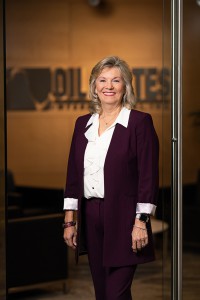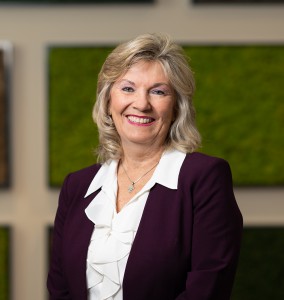By Kristin Hincke, PESA
As a member of the Oil States team since 2000, CEO Cindy Taylor has seen her fair share of ups and downs in the oilfield services and manufacturing sector. Eager to make a positive impact, Taylor has changed the face of the industry with her strong value system and authentic demeanor. Her business degree led her to Houston and ultimately into the energy sector, but it was the entrepreneurial spirit of the industry that has kept her here.
“There is just something about this industry that you fall in love with, and I think it’s that pioneering spirit that so many in the industry possess,” she said. “Workers from all walks of life pioneer new regions of the world in an effort to provide low cost reliable energy to our global population. While I can’t necessarily explain it, you just fall in love with the industry.”
Her career path included a stint in public accounting working for producers, drilling companies, manufacturers and trading companies, all giving her a broad background in the fundamentals of the energy industry. So why did she leave public accounting? “I really wanted to control my destiny, build something of value and grow it,” she said.
With this background, Taylor developed the clear vision required of an industry leader, a steadying force in a cyclical industry. While volatile commodity prices can play havoc with balance sheets and budgets, Taylor noted that the industry has weathered downturns before and survived.
“We should never forget the industry is cyclical,” she said. “A lot of current discussion and focus of Wall Street and private equity companies is to identify strong sources of free cash flow, ROIC and profitability. In the context of a very highly cyclical industry, success is determined by having the right strategy, the right capital allocation framework, and the right leadership team. You can be very successful, but there are going to be times that you have to make strategic decisions at peaks and valleys of the cycle. You need to be able to look through the cycle and make investments that generate solid returns for shareholders.”
She reflected on the significance of losing roughly 80% of the U.S. rig count in an 18-month period and how the industry responded to such a severe downturn driven by the decline in crude oil prices.
“Just imagine if you entered into a multibillion-dollar commitment that spanned three years and you lost 80% of your activity in 18 months,” she said. “Capital intensity is always a risk factor with me because it’s difficult to adjust major capital projects through volatile cycles. Horizontal drilling, extended reach technologies, longer laterals, fracking, pressure pumping, zonal isolation, are the technologies that leveraged increased activity on land. The wells we complete are generally very economic, but still capital intensive.”
 GLOBAL REFOCUSING
GLOBAL REFOCUSING
Taylor sees a lot of capital still focused on U.S. land production. While commodity prices have fluctuated – at times looking as though the market was going to improve – global shifts in supply and demand have repeatedly caused the industry to refocus.
“What we’re seeing today is the realization that you’ve got to drill a lot of wells in the United States to generate long-term sustainable production,” she said. “We were really successful at advancing technologies, so much so that the rate of production growth exceeded global demand growth in the process.”
Taylor believes that increased production in the U.S. has “de-risked” supply for the United States, offsetting declines such as from the instability we have seen in Venezuela and the Middle East.
“I think we have probably tested the limits of what we can do in terms of production growth in the United States, particularly in a crude price band of $50 to $55 a barrel,” she said. “That’s leading people to say, ‘where are the other prolific basins?’”
Taylor said opportunities exist for production in other areas around the globe, including offshore areas like Guyana and Brazil, as well as basins around Southeast Asia, the North Sea and the Gulf of Mexico.
“We’re in a solid position because we have more of a global footprint with a balanced offering of products and services,” she said. “We have exposure to international activities, to deepwater and to U.S. land. Strategic shifts depend upon the investment priorities of our customers at the end of the day, but we’ve got the platform and capacity to take advantage of opportunities to support our customers.”
“I can’t think of another chair I’d rather sit in in this city than the one I do because of the health of the company and the leadership team that I have. We’ve always been free cash flow generating,” she said. “I don’t know how you manage if you’re not. We actually did a look back and saw for the last six years – including the extreme downturn in 2016 – we were cash flow positive in every quarter but two.”
Her work as a member of the board of directors of AT&T has given Taylor a deeper understanding of the needs of investors and shareholders. She sees leadership development as a fundamental aspect of corporate success.
“Board services help me as a CEO, quite frankly, to understand the concerns, desires and motivations of my fellow board members and shareholders,” she said. “I say every CEO should sit on a public company board because you become a lot more understanding of the perspectives that your own board members have.”
ESG CONSIDERATIONS
Cindy noted the rise in concerns related to ESG (environment, social and governance) by investors and stakeholders. Taylor has been in the forefront of the movement for the oil and gas services and equipment sector in an effort to provide needed ESG data not only to investors, but also to the general public.
“My message to everybody is that if you’re not listening to this trend, you’re making a mistake,” she said.
“I think we all have to be more open to conversations about ESG. We need to collaborate and meet in the middle on issues like this so that constructive dialogue can occur. No one in this industry wants to destroy the Earth or the climate. However, there are realities around world population growth, GDP growth, and all of the technology and conveniences we have today that need to be considered. The reality is you can’t eliminate oil and gas production and sustain the level of economic growth that we desire. Therefore, we need to operate in an environmentally friendly manner.”
She acknowledged that ESG may still be a mystery to some, especially those not working for a publicly-held company who routinely interact with a diverse group of stakeholders. She encourages companies to not only research their ESG scores but also help the rating agencies compile the most accurate and up-to-date information.
“We need to go through those reports, correct the errors, fix the omissions, put information on the website or direct them to places where they can find the policies, procedures and other information that they want to understand. Developing an ESG report that summarizes key data in one place is becoming a best practice.”
Taylor said that while there are still challenges to be solved, such as flaring natural gas and water management, the industry is addressing many issues but could be doing a better job of spreading that message.
“I think at the end of the day, you’re going to see companies in the energy industry openly participate in the dialogue, because it is increasingly becoming a mandate for the long-term survival and health of the industry,” she said.
[su_quote cite=”Chris Cragg, Executive Vice President – Operations, Oil States International and PESA Chairman Emeritus”]“Cindy and I have worked together for over 20 years. As one of the first female CEOs in our industry and our leader for many years, Cindy has earned the gratitude and commitment of all of our employees and other constituencies at Oil States. She is respected throughout the business and civic communities with her tireless work on many charitable organizations (especially her beloved Aggies!). We have a great team at Oil States, and the tone definitely starts at the top.”[/su_quote]
DIVERSITY & INCLUSION
As the historically male-dominated industry evolves, many are looking to Taylor for guidance on how best to increase diversity in the workforce.
“I want the best people – regardless of gender, race, political persuasion, etc. – to work for this company to make it be the best that it can be,” she said. “I always say, set reasonable standards. You shouldn’t expect that the C-Suite be 50% female if you haven’t developed a diverse talent pool to draw from. We need to collectively promote our industry and establish mentoring initiatives to achieve a talent pool with the requisite backgrounds to succeed.”
 Taylor also advocates for involving women and men in efforts to diversify the workforce. “There are so many male advocates that I’ve had over the years that made such a difference for me, sometimes advocating for my success more than I even thought I was ready for,” she explained. “Thanks to them, I have only good things to say about the industry, male sponsorship and the city of Houston.”
Taylor also advocates for involving women and men in efforts to diversify the workforce. “There are so many male advocates that I’ve had over the years that made such a difference for me, sometimes advocating for my success more than I even thought I was ready for,” she explained. “Thanks to them, I have only good things to say about the industry, male sponsorship and the city of Houston.”
Referring to the influence she has felt as an alumna of Texas A&M University, Taylor embraces the cultural values of her upbringing and acknowledges those experiences and the people that helped shape her career.
“Try to emulate those people that were part of your career development. For me, part of the journey will always take me back to College Station. My time at Texas A&M helped me not only from an educational standpoint, but it also helped me form life-long relationships, connect with mentors and develop my own sense of ethics and core values. I’m a better person for having that experience.”
[gdlr_button href=”https://issuu.com/pesanews/docs/energy_connection_magazine_february_2020″ target=”new” size=”medium” background=”#3D90C7″ color=”#ffffff”]READ THE MAGAZINE[/gdlr_button]
[gdlr_button href=”https://energyworkforce.org/energy-connection-magazine/” target=”_self” size=”medium” background=”#3D90C7″ color=”#ffffff” with_border=”yes” border_color=”#999999″]SUBSCRIBE[/gdlr_button]





